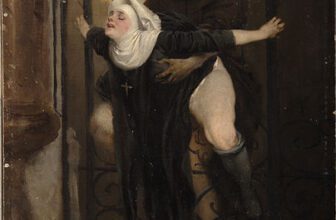The Scandalous Tale of Frances Carr, Countess of Somerset
In the early 17th century, the English court was a place of opulence, intrigue, and ruthless ambition. Under the rule of King James I, courtiers jockeyed for influence in a world where reputation could rise or fall on a whisper. Among the glittering aristocracy of the time, few figures rose higher, or fell more spectacularly, than Frances Carr, Countess of Somerset. Once a celebrated beauty and a member of one of the most powerful noble families in England, Frances Carr became infamous for her role in one of the greatest scandals of the Jacobean era: the murder of Sir Thomas Overbury.
This is the story of Frances Carr, born Frances Howard, a woman whose life was a dramatic blend of wealth, love, manipulation, and criminal infamy. Her tale is one of personal defiance against societal norms, as well as a chilling example of how courtly power and politics could lead to tragedy.
Who Was Frances Carr?
Frances Carr was born Frances Howard in 1590, into the prestigious and ambitious Howard family, a dynasty with deep roots in English nobility. Her father was Thomas Howard, 1st Earl of Suffolk, and her mother was Catherine Knyvett, a woman known for her strong will and political maneuvering.
The Howards were staunch supporters of the Catholic cause in a Protestant England, but they navigated the court with tactical savvy. Frances was raised in this world of political finesse, acquiring the manners, intellect, and beauty expected of a noblewoman.
In 1604, at the tender age of 14, Frances was married to Robert Devereux, 3rd Earl of Essex. It was a political union arranged by their powerful families, one designed to secure influence at the royal court rather than reflect mutual affection. Essex was a young man himself, but the marriage was immediately strained. Frances reportedly found her husband cold, unappealing, and immature.
During her years in this unhappy marriage, Frances Howard found herself drawn to another man, Robert Carr, a favorite of King James I.
The Rise of Robert Carr and the Courtly Affair
Robert Carr was a Scottish nobleman who had caught the eye of King James I due to his charm, youth, and striking good looks. The king, who had a well-documented preference for handsome male courtiers, quickly elevated Carr to positions of wealth and influence, despite his modest beginnings and limited education.
As Carr gained prominence at court, he met and began a passionate affair with Frances Howard. The two quickly became one of the most talked-about couples in England. However, there was one major obstacle: Frances was still married to the Earl of Essex.
Rather than accept the limitations of her arranged marriage, Frances made a bold decision that would change her life and send shockwaves through the aristocracy, she petitioned for an annulment.
The Controversial Annulment
In 1613, Frances Howard publicly sought to have her marriage to Robert Devereux annulled on the grounds of non-consummation. The petition was both scandalous and politically explosive. Her claim? That she remained a virgin because her husband was impotent.
The case dragged on for months and was heavily publicized. Essex denied the accusations and submitted to humiliating examinations. The court’s attention turned to whether the issue was truly physical, or if Frances had remained “unconsummated” by her own refusal.
What made the case even more controversial was the fact that Frances underwent a physical examination by a group of matrons and midwives to confirm her virginity, a rare and scandalous act for a woman of her standing.
The annulment was ultimately granted in 1613, but not without serious political fallout. Many believed the decision was influenced by the King’s favoritism toward Robert Carr. The newly freed Frances immediately married Carr, and he was subsequently granted the title Earl of Somerset.
However, their union would soon be overshadowed by a far darker event, the mysterious death of Sir Thomas Overbury.
The Murder of Sir Thomas Overbury
Sir Thomas Overbury was a close friend and advisor to Robert Carr. As Carr rose through the court ranks, Overbury served as his confidant, helping him navigate the political complexities of King James’s inner circle.
But Overbury did not approve of Carr’s relationship with Frances Howard. He reportedly believed the match would tarnish Carr’s reputation and hinder his career. Overbury’s opposition was so strong that he allegedly threatened to reveal damaging information about Frances to prevent the marriage.
Fearing his influence, Frances and her allies conspired to remove Overbury from court. In 1613, the same year Frances’s marriage was annulled, Overbury was offered an ambassadorship to Russia, which he refused, suspecting a trap. As a result, he was imprisoned in the Tower of London under dubious circumstances.
There, he mysteriously died within a few months.
Though his death was officially attributed to natural causes, rumors circulated that Overbury had been poisoned. These whispers persisted for two years, until 1615, when an imprisoned apothecary confessed that he had supplied poisons to Frances Carr’s agents. Suddenly, the mystery of Overbury’s death became a national scandal.
The Trial of Frances and Robert Carr
The investigation that followed was a sensation. Several individuals were arrested and tried, including Frances’s servants, gatekeepers, and the Tower lieutenant. Evidence emerged that Frances Carr had orchestrated the poisoning by sending drug-laced tarts, enlisting corrupt officials, and using false names in letters.
In 1616, both Frances and her husband were arrested and charged with murder. Their trials were widely publicized, and the details were salacious: reports of love potions, disguises, and bribes painted a picture of a woman driven to murder by ambition and jealousy.
Frances pleaded guilty, likely hoping for leniency. Robert Carr maintained his innocence but was convicted nonetheless. Both were sentenced to death, a sentence that could have ended their lives and lineage.
But here, the influence of the royal court intervened once again.
Royal Pardon and Imprisonment
Despite the guilty verdicts, King James I commuted their sentences. Instead of execution, the couple was imprisoned in the Tower of London, where they remained for several years. The exact reasons for the King’s clemency remain debated: some historians suggest he feared that executing Carr, his former favorite, might reflect poorly on himself; others believe political pressures and sympathies played a role.
In 1622, after nearly six years in prison, Frances and Robert were released. They lived out the rest of their lives quietly in relative obscurity, never again returning to their former positions of influence. Frances Carr died in 1632 at the age of 42.
The Legacy of Frances Carr
The scandal surrounding Frances Carr remains one of the most infamous in English history. It was a cautionary tale about the dangers of courtly ambition and the consequences of love pursued at all costs.
Historians have long debated her motivations. Was Frances a cold-blooded schemer, or a woman trapped by the limitations of her gender and the machinations of powerful men? Her determination to escape an arranged marriage, pursue her own desires, and wield influence in a male-dominated world can be read as both a feminist act and a morally questionable one.
Some view her as a tragic figure, a woman punished for seeking control over her own life in an era when noblewomen were expected to remain submissive. Others see her as a classic femme fatale, using beauty and cunning to manipulate those around her.
Regardless of interpretation, her story continues to fascinate writers, scholars, and dramatists. The Frances Carr affair has inspired novels, plays, and even TV documentaries, securing her a place in the annals of England’s most notorious historical figures.
Cultural and Historical Impact
The Countess of Somerset’s trial highlighted several significant social and political themes of the time:
Women’s agency: Frances’s efforts to escape her first marriage and choose her own partner broke the mold of passive noblewomen. Her scandal revealed the deep anxieties about female power in the Jacobean court.
Court corruption: The involvement of the King, his favorites, and the manipulation of legal systems underscored the pervasiveness of corruption and favoritism in Stuart politics.
Media and public spectacle: The Overbury affair was one of the first instances where a trial became a widespread media event, with pamphlets, plays, and gossip detailing every twist and turn.
The tale of Frances Carr is not just about a woman’s fall from grace, it’s about the entire machinery of power, sex, and manipulation that defined the court of King James I.
The life of Frances Carr, Countess of Somerset, is a gripping saga of love, ambition, betrayal, and redemption. From her youth in a powerful noble family to her fiery affair with a royal favorite and eventual entanglement in a murder scandal, Frances lived a life that defied the expectations of her time.
Her story endures not only because of its dramatic elements but also because it reflects the tensions between personal agency and societal constraints, issues that still resonate today. Whether seen as a victim of her circumstances or a mastermind of manipulation, Frances Carr remains a symbol of the dark glamour of the Stuart court and the high stakes of life among the aristocracy.
A cautionary tale and a historical mystery all in one, the rise and fall of Frances Carr continues to captivate, and to haunt, the pages of English history.




